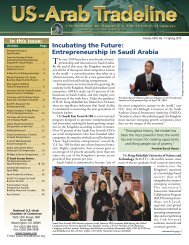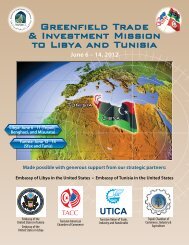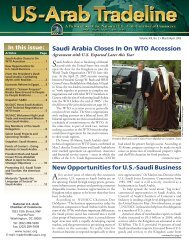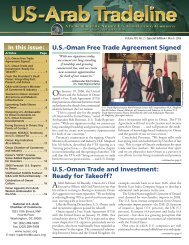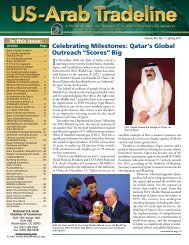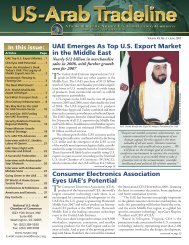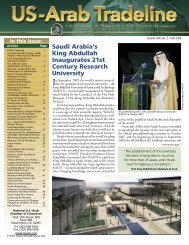Jordan - National US-Arab Chamber of Commerce
Jordan - National US-Arab Chamber of Commerce
Jordan - National US-Arab Chamber of Commerce
Create successful ePaper yourself
Turn your PDF publications into a flip-book with our unique Google optimized e-Paper software.
Intel Corporation: Helping to Realize <strong>Jordan</strong>’sPotentialIntel Corporation, the world’s largest chipmaker, hasmade significant investments in <strong>Jordan</strong> in recent yearsas a result <strong>of</strong> the Hashemite Kingdom’s strong commitmentto information technology (IT). Intel <strong>of</strong>fers thelatest technology solutions to multinational companies,local systems integrators, and independent s<strong>of</strong>twareproviders.“Intel stronglybelieves in the needto spread the use <strong>of</strong>IT in cross-sections<strong>of</strong> society to helpcountries achieve aknowledge-basedeconomy andcompete at the globallevel,” says AbdulJarrar, Intel’sRegional GovernmentAffairsManager for theMiddle East, Turkey,and Africa. “In view<strong>of</strong> that, we support<strong>Jordan</strong>’s IT initiativesand want tocontinue workingwith the <strong>Jordan</strong>iangovernment to play a key role in enabling this transformationthroughout the Kingdom.”Intel’s first “Teach to the Future” program in theMiddle East was established in <strong>Jordan</strong> in 2003. To date,more than 15,000 teachers in <strong>Jordan</strong> have been trainedas part <strong>of</strong> this program, a worldwide effort to help bothexperienced teachers and pre-service teachers integratetechnology into instruction. Participating teachers receiveextensive instruction and resources to promote effectivetechnology use in the classroom.Launched in 2000, the “Teach to the Future” programhas trained more than one million classroom teachersin 30 countries, and this number is expected to rise totwo million teachers by the end <strong>of</strong> 2005.Intel is also about to open the second Intel ComputerClubhouse in <strong>Jordan</strong>. At the Clubhouse, underservedyouth have access to high-tech equipment and mentorsin order to develop skills that encourage self-confidenceand foster creativity and opportunities.In 2002, when Intel CEO Craig Barrett gave thekeynote address at the <strong>Jordan</strong> ICT Forum, Barrettinaugurated an Internet Laboratory (I-Lab) at theUniversity <strong>of</strong> <strong>Jordan</strong>. The first I-Lab in the <strong>Arab</strong> world,it forms part <strong>of</strong> the University’s King Abdullah II College<strong>of</strong> Information Technology.The I-Lab provides an academic forum to test andevaluate new entrepreneurial business models and theirtechnical implementation with the assistance <strong>of</strong> Internettechnologies and high-tech solutions. The I-Lab alsoprovides a research and development environment forareas such as simulation, content translation and localizationinto the <strong>Arab</strong>ic language, image processing,Craig Barrett , CEO <strong>of</strong> Intel Corporation, during his keynote speech at IDF Spring 2004 in San Francisco.voice recognition, and multimedia.”We thank Intel Corporation for its contributionand the support <strong>of</strong> all involved,” noted Dr. Ahmad AlJaber, Dean <strong>of</strong> the Faculty <strong>of</strong> Information Technologyat the College. “We want to create an incubator whereacademic staff can provide the support for start-upcompanies and innovative business and research ideas.We are really looking forward to a long, fruitful andcontinuous relationship with Intel.”Barrett concluded his 2002 visit on a cautionarynote: “<strong>Jordan</strong> is taking the right steps towards creatingits digital future, but long-term economic prosperitywill require new approaches to business and technologyinnovation,” he said in a speech to government andbusiness leaders. “<strong>Jordan</strong> should accelerate its investmentin the Internet, reduce taxes and tariffs on informationtechnology (IT) products, foster entrepreneurs, protectintellectual property, and build a strong educationalfoundation that trains the workforce tomorrow.”“In the digital future, people will access the Webany time and any place with devices and infrastructurethat <strong>of</strong>fer both computing and communication capabilities,”Barrett said at the time. “Countries that intendto successfully compete in tomorrow’s global digitaleconomy will move fast to invest in education andinformation technology and let both flourish.” ✦The Teach to theFuture programhas trained morethan one millionclassroom teachersin 30 countries,and this numberis expected to riseto two millionteachers by theend <strong>of</strong> 2005.November/ December 2004 • <strong>US</strong>-<strong>Arab</strong> Tradeline 11




